Euro Survival
The Enormity of Saving the Ailing Currency
So, what's necessary for the euro to survive?
Well, its member countries each have to be competitive otherwise the weaker economies are unable to pay their own way in the world. They consume more than they sell abroad and become more and more indebted..
The remedy available to other uncompetitive countries of devaluing
their currency to make their exports cheaper isn't available inside the eurozone.

Euro Survival
Irish David McWilliams "We are pretending that we have a currency. We don't have a currency. If you have a currency, like Britain has, you can print it when you're in problems, which is what you are doing. You can devalue it, which is what you're doing. That's the essence of the currency. We don't have a currency. Our elite say, 'Our currency is the euro.' It's got nothing to do with us."
If you can't devalue your currency because you're locked into a monetary union, the only answer is to become more competitive by reducing costs. That means slashing public services, cutting wages, making people poorer.
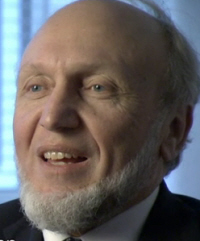
Hans-Werner Sinn
Professor Hans-Werner Sinn "The bitter truth is that some European countries have become too expensive and they have to
devalue within the euro becoming cheaper. This is a very painful process, but there's no way out. If they don't become cheaper,
their current account deficits will persist for ever."
It's a lesson that was learned in Germany more than a decade ago.
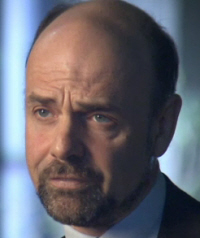
Gustavo Piga
Gustavo Piga "The Germans understood the competitive pressures that were coming from China and India and the rest of the world.
They sat down with unions in the late 90s. They decided to have a wage moderation, changes in the ways work works, changes in
productivity. They did their job right."
Gerhard Schröder "We adopted a really severe programme and saw through despite some serious difficulties. In the end, it cost me
my job. This was a place we had to pay. But today, Germany is doing far better than most other countries in the EU."
Here's what's pulling the Eurozone apart. Since 2000, the costs of employing workers in Italy, Spain, Ireland and Portugal
has risen between 30% and 40% more than in Germany, which makes their businesses very uncompetitive. It means that in order
for Spain, Italy and the rest to stop living on credit, living standards for their people may have to drop by a third.
Professor Hans-Werner Sinn "Some European countries would have to reduce their prices, the places for their own good, by
30%. How can you do that? It's easy to talk about it, but it's very difficult to do that. You have to change millions of
prices, millions of wage contracts. The unions will be in the streets."
Enabling a country like Spain or Italy to compete with Germany is going to be hard. Italy's new prime minister, Mario
Monte, an unelected technocrat, is slashing public expenditure. He's also trying to reduce the costs of public sector
and private sector by reforming the rights and privileges of workers.
The good life, Italian style, is under threat. Italy has endured years of low growth. It's a malaise that must be
cured. The problem is, the medicine's turning out to be extraordinarily painful, to put it mildly.
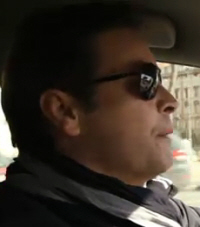
Roberto Masula
Roberto Masulo "Look around you. Taxes aren't moving. The economy is sick. The business is gone. We are living on a
knife edge here. Our livelihood is very precarious."
In Italy, taxi driving has traditionally been a closed shop. It's one of the first trades at Mario Monte wants to open up
to competition.
Do you understand why the government of Mario Monte is trying to shake up your industry, trying to abolish lots of
the rules that control the taxi trade?
Roberto Masulo "If they want to create some jobs without spending any money by letting anyone driving a taxi, and
not like we had to, waking hour calm, buying a license which we had to pay for upfront, it's going to turn nasty."
The dismantling of restrictive employment practices has already led to national protest. Transport workers,
pharmacists, lawyers and many in the public sector, as well as taxi drivers, have all been on strike. The future
for many looks challenging.
Roberto Masulo "15 years ago, I would have been happy for my son to carry on the family tradition of taxi driving.
Today, I hope the future will be more rosy for him and that he'll find a better job."
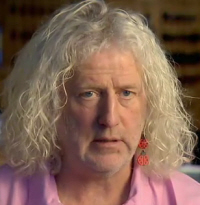
Mick Wallace
Since the crisis, living standards in Ireland have been squeezed by around a fifth.
Mick Wallace "When we joined the euro, we became part of a bigger currency. I thought it would be to our benefit and
it probably was for a while. Now, of course, we realise we all weren't playing on the same level playing pitch. The
Wexford youths, is our football club, we're not good enough to play with Bayern Munich. And that's what we're trying
to do in economic terms."
Horst Schuler "At the moment, we're working in three shifts because of the current high sales volume. We had to
start working a third shift because two shifts couldn't cope with the high demand."
Hour for hour, worker for worker, Germans like Horst are far more productive than their Italian and southern
European competitors. Where Italy and Ireland are massively indebted, German efficiency has created the largest
surpluses in Europe.
Hartmut Jenner "There's no doubt that the euro is a success for Karcher. Our sales abroad is 85%. The total sales
of the group is €1.7 billion. We doubled our business in the last 10 to 11 years, so our growth rate is double-digit
every year. That is our target also."
But Horst and other German taxpayers fear they'll end up with a huge bill for bailing out the weaker economies.

Horst Schuler
Horst Schuler "it was a good decision to have the euro for Germany, but at the same time, I don't think it's fair
that we are getting a bit punished when it hadn't been such a success in other European countries."
Germany, which is paying for the rescues of the troubled economies, is insisting that bailed-out countries live
within their means. Not everyone likes taking the supposed medicine.
David McWilliams "listen, I never voted for Nicolas Sarkozy. I never voted for Angela Merkel. So, I didn't vote
for them to tell me what to do."
Some would say, Europe is now being run by the government with the deepest pockets, Germany, precisely the opposite
of what President Mitterrand hoped monetary union would achieve. That may be because the political union he thought would
follow monetary union is yet to happen.
Gerhard Schröder "The crisis at least makes one thing obvious. We need more of Europe. Political union is only way to
save the stability of the euro."
Jean-Claude Trichet "It seems to me that Europe could go for a federation. This is a citizen who speaks there, the citizens
of Europe. I'm not speaking as former governor of the ECB, but as a citizen. Of course, it's a decision which has to be taken
by the people of Europe."
The creation of a fully fledged United States of Europe, a federal super-state, with taxing, spending and borrowing
all decided centrally, maybe how to save the euro and restrain German power. But recent elections in France and Greece
show voters rejecting austerity. The Eurozone is becoming less united, politically and economically.

George Soros
George Soros "The underlying forces are still driving the countries apart. The divergences getting wider and the
perspectives of the various countries are more and more at loggerheads."
Spain, buckling under the weight of huge debts, is causing particular concern. Spanish banks remain weak and need
to be strengthened with the big injection of capital to absorb potential losses.
Terry Smith "The Spanish banks are very vulnerable. This clearly got a very large local banking sector which is
controlled by local authorities, and if you want to look for sort of crony capitalism, corruption and, as a result,
very large loan losses, look for that sort of thing. And if you can combine that with the construction boom, you
really off to the races. And Spain now has more unsold housing units than the United States of America, which is
a pretty startling statistic."
Spain manifests all the eurozone's flaws – the bloated property market, huge debts broadening businesses and
households, ailing banks, the government unable to balance its books. But with a quarter of the workforce unemployed,
will Spain be the next to turn against the cuts?
George Soros "To impose fiscal austerity forces reduction in public employment, so you already have 48% of the
Spanish young people out of jobs. So, the danger of social unrest is getting bigger and bigger."
Whatever happens, millions of Europeans in the highly indebted countries are becoming poorer, year after grinding year.
Having voted against austerity, the Greeks have been told to grin and bear it or get out of the eurozone. But a Greek exit
could kill the euro, and that could lead to a chain reaction of collapsing banks, which would pose terrible dangers for Britain.
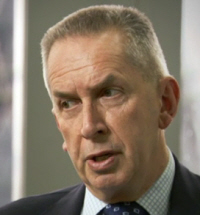
Terry Smith
Terry Smith "Our banking sector is very international and we simply cannot cut ourselves off from problems that occur in the
Eurozone. We've actually got a financial services sector that is probably of the order of six times bigger than our underlying
economy if you gauge it against places like North America. And so, it's both a big problem for our banks, and a big problem
for our economy in general, if that occurs."
The choice confronting the Eurozone looks profoundly unappealing. If it survives, millions of Europeans face years of
squeezed living standards. But if it were to fall apart, well, households, businesses, banks, governments would face the
risk of going bust. And that would have a devastating impact on Britain, on our banks, on or our living standards. So,
although the cost of saving the euro may seem high, the price of letting it collapse, well, that could lead to the kind
of economic depression and financial mayhem we haven't seen since the 1930s.







